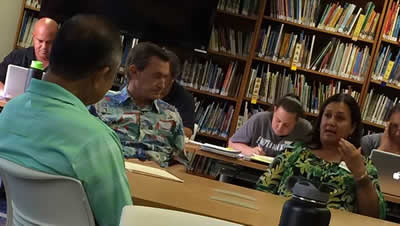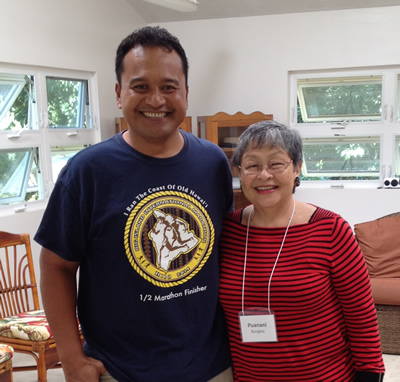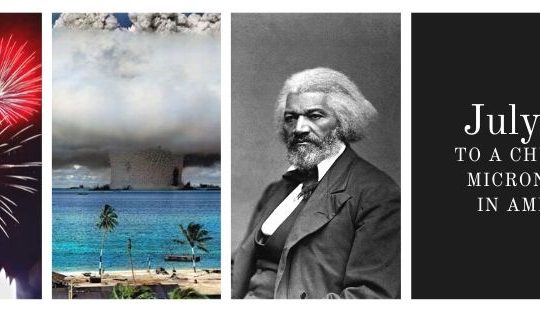I’m very glad to be reunited with Ed.D Cohort 2 (C2) today for our first day of the Fall 2014 classes. It was a real privilege to listen to 3 educational leaders (Dr. Makalapua Alencastre, Dr. Val Iwashita, Dr. Dan White) discuss the topic, “What are the characteristics of an ideal leader in the realm of your profession?” Many of their viewpoints resonated with me in my work. I especially appreciated their humility and their focus ultimately on respect for others as the starting point of leadership.
While listening to the panelists, I found myself reconnecting with my past experiences of leadership growing up on a small remote island of 400 people in the middle of the Pacific. Who were the leaders? Why were they considered leaders? How did they conduct themselves on a daily basis to continue to earn the respect of the people? Ultimately, ideal leadership for me can be summed up in three words, “Respect For Others.”
The place of respect in leadership resonated with my past lived experiences as a former Jesuit. I am blessed to have been educated in the United States in the Jesuit educational philosophy of forming “men and women for others.” This model of education focused on forming leaders who would lead authentic lives of service to humanity. But the valuing of the other has been a lived experience of indigenous leadership in the Northwest region of Chuuk State, Micronesia.
The EdD journey is an opportunity to honor my roots and heritage. It has re-awakened a desire to reconnect, reaffirm, and reinvigorate those long buried experiences of my past. I can no longer simply let foreign values and traits displace the authenticity of my own indigenous Micronesian leadership values. It is my responsibility for these next 3 years to undergo a re-learning process that brings together my past with my lived experiences in the US. Hopefully, I can emerge from this journey a more authentic, respectful, humble, effective Chuukese leader who continually commits to be a man of service for and with others.
Take Aways…
The following are some of the notes and reflections from the fishbowl-style discussion. I take responsibility for all misquotes or misunderstanding of their points. It was an incredible intimate discussion among three leaders and mentors in our program. [Photo by Chelsea Keehne]
- Leadership is about community and the collective values
- Develop and support community whereby the community shares values and direction, but the responsibility for the entity
- It’s much more effective if everyone is concerned about everything; where everyone feels responsible; not to be so tied to an organizational structure, but tied to common responsibility
- Kuleana = responsibility
- Compliance will kill innovation and freshness
- In my respecting my colleagues, they give me the benefit of the doubt, give me a break, and become partners
- Pono = living righteousness, living the right, knowing what is right; ideal leader
- Ho’o Pono Pono = Knowing what is right, then doing something about it
- Ideal leader “takes some of the credit and all the blame.” Taking responsibility for whatever happens.
- A leader who blames the higher ups weakens their authority
- Ideal leaders are the ones who understand that connection with followers is crucial.
- Leaders should never dilute themselves thinking that they are not being being used for something; the question is to know what is one being used for by whom
- Knowing how one wants to be treated; treating others as such
- Most people want to be respected, appreciated, and understood about their being and individuality
- Effective leaders bring that degree of respect to an organization, the people in the org, traditions and values of the organization.
- The values you put on others is what comes back to you.
- Best leader is when people don’t know who the leader is.
- Modeling the values of the organization is ideal leadership
- “A good leader is more of a plow horse than a show horse” – by Jim Collins
- Aloha – the values of how you are treating each other
- Who are your models, your heroes that you are leading your life after?
- Institutionalize the process of receiving criticism; find the people who will offer your honest criticism
- How do you balance the care and conviction of your colleagues with disagreements and allowing people to think outside the box – Ideal leader knows that is a value
- Ideal leaders form and mentor the next successors
- You’re never fully ready for a leadership role; otherwise, you run the risk of being arrogant and disrespectful of the learning process that must occur from colleagues, community, traditions, etc. There needs to be humility in
- Ideal leaders take people where THEY want to go
- Listen!
- “Get the right people on the bus, in the right seat, and take them where they want to go.” – Jim Collins
- “Change happens at the speed of trust.”
- Leadership is less about position, but more about disposition.






